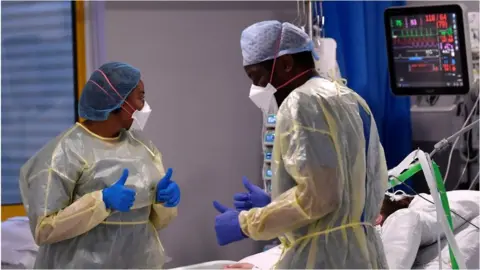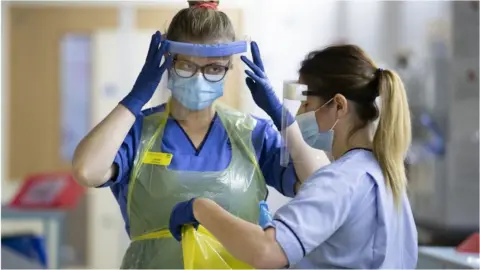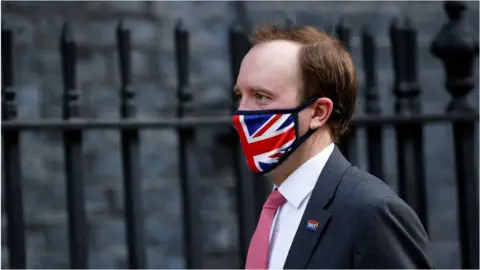Covid: Why were the government's Covid contracts challenged?
 Reuters
ReutersDuring the pandemic, the government awarded thousands of contracts to private companies, spending billions of pounds of public money.
They covered everything from personal protective equipment (PPE) - masks, gowns and gloves - to services such as researching public opinion about Covid measures.
But the way these contracts were awarded led to accusations of a lack of transparency and there have been court rulings against the government.
How much was wasted?
A report from the Public Accounts Committee in June 2022 found that of £12bn spent on PPE:
- £4bn did not meet NHS standards and has not been used
- £4.7bn has been written down to reflect how prices have fallen since it was bought
- £673m was spent on PPE that was defective
- £2.6bn has not been used because it is not of the type or standard preferred by NHS staff, even though it met the required standards.
The report said that the government is offering some of the PPE that cannot be used by the NHS to other organisations and countries, but that it was also planning to burn "significant volumes" to generate power.
What are the normal rules?
Usually, when the government needs to buy something, it must start a "competitive tendering process".
A department will publish specifications of what it wants. Companies are encouraged to bid by stating the price at which they could offer it and details such as the quality of the product.
The government checks the companies will be able to provide it and signs a contract with the one offering the best value for money.
The process can take anything from a few months to a few years depending on the requirements (whether it is, say, a laptop or a submarine).
The government has pre-approved suppliers and sometimes only these will be allowed to bid.
By law, the government is required to publish a "contract award notice" within 30 days of signing any contracts for public goods or services worth more than £120,000. It is also required to publish the details of every contract worth over £10,000.
 PA Media
PA MediaWhat happens in an emergency?
The rules allow the government to go directly to a preferred supplier without any competition - a "direct award".
It is allowed if there is only one possible supplier or in cases of "extreme urgency" - where there is a risk to life, for example.
According to a report published by the National Audit Office (NAO), between March and July 2020, new contracts worth £17.3bn were awarded to suppliers:
- £10.5bn were awarded directly without any competition
- £6.7bn were awarded directly to pre-approved suppliers (although they were not necessarily pre-approved for the products they were selling)
- £0.2bn were awarded using a competitive process
The government is still obliged to publish details of large contracts if they're issued by direct award.
 Reuters
ReutersWhy was this system challenged?
The Good Law Project took legal action against Michael Gove for the Cabinet Office's decision to use market research agency Public First and questioned the involvement of the prime minister's former adviser Dominic Cummings.
The High Court ruled that the awarding of a £560,000 contract to the company - run by their former colleagues - without considering other firms, could be seen as suggesting a "real danger" of bias.
But that was overturned by the Court of Appeal, which ruled that failing to run a comparative exercise did not necessarily mean the decision-maker was biased.
In another case, it was the failure to publish details of contracts within the required 30 days that led the judge to rule that the then health secretary, Matt Hancock had acted unlawfully.
The public had a right to know where the "vast" amounts spent had gone and how contracts were awarded, the judge said.
The Good Law Project points out that the government published the details of 40 PPE contracts worth £4.2bn in June 2021, which were awarded a year before, despite having said in February 2021 that all the details of PPE contracts had already been published.
In documents seen by the BBC, government lawyers admitted on 25 February 2021 that 100 contracts for suppliers and services relating to Covid-19 (signed before 7 October 2020) had yet to be published. Three days earlier, the then prime minister Boris Johnson had told MPs that the contracts were "on the record for everyone to see".
Problems with orders
Between the start of the pandemic and 30 May 2021, the Department of Health distributed more than 11.7 billion items of PPE.
But there have been problems with orders, as the BBC has been reporting throughout the pandemic:
- Fifty million face masks bought in April 2020 could not be used in the NHS because they did not meet its specifications.
- Britain's safety watchdog felt political pressure to approve the use of PPE suits, which had not been tested to the correct standard, the BBC discovered.
- The use of 10 million surgical gowns was suspended for frontline NHS staff because of how the items were packaged.
- A million high-grade masks used in the NHS may not have met the right safety standards and were withdrawn.
- A firm is being investigated by the UK medical regulator after it was awarded a £30m contract during the pandemic.
The BBC also discovered that millions of medical gowns were never used, having been bought from a company called PPE Medpro for the NHS at the end of the first lockdown for £122m.
Labour criticised the government for awarding contracts to the company, which had previously been linked to Conservative member of the House of Lords Michelle Mone.
She has previously told the BBC through her lawyers that she never had any role or function in the company, or in the process by which contracts were awarded.
Baroness Mone is being investigated by the House of Lords Standards Commissioner in connection to PPE Medpro. On 6 December, her office announced that she is "taking a leave of absence from the House of Lords in order to clear her name of the allegations that have been unjustly levelled against her".
What was the VIP lane?
In order to help the government choose between the huge numbers of offers it was getting, it introduced a "high-priority" or VIP lane on 2 April 2020.
The idea was to treat offers of PPE with greater urgency if they came from a supplier recommended by ministers, government officials or MPs and members of the House of Lords, from any party.
The NAO report found that up to the end of July 2020, about one in 10 suppliers who had been put in the high-priority lane were awarded government contracts, while the figure was less than one in 100 for other suppliers, outside the lane.
A problem was that the Cabinet Office, which led the process, was allegedly "not entirely upfront about how it was done", according to Tom Sasse from the Institute for Government.
"The Cabinet Office did not manage to keep a proper account of who recommended a particular supplier, which opens it up to accusations of cronyism."
A government spokesperson told Reality Check: "Proper due diligence is carried out for all government contacts and we take these checks extremely seriously.
In November 2021, the Good Law Project used a Freedom of Information request to get a list of 50 companies that had been on the VIP lane, together with the people who had referred them.
Of the 20 that had been referred by politicians, all were Conservative members of the House of Commons or the House of Lords. Five of them involved Mr Hancock.
In January 2022, the High Court ruled that the use of the VIP lane had been unlawful, following a legal challenge over the awarding of PPE contracts to two companies.
But the High Court also ruled that the companies were "very likely" to have been awarded contracts anyway.

- A SIMPLE GUIDE: How do I protect myself?
- AVOIDING CONTACT: The rules on self-isolation and exercise
- WHAT WE DON'T KNOW How to understand the death toll
- TESTING: Can I get tested for coronavirus?
- LOOK-UP TOOL: Check cases in your area




